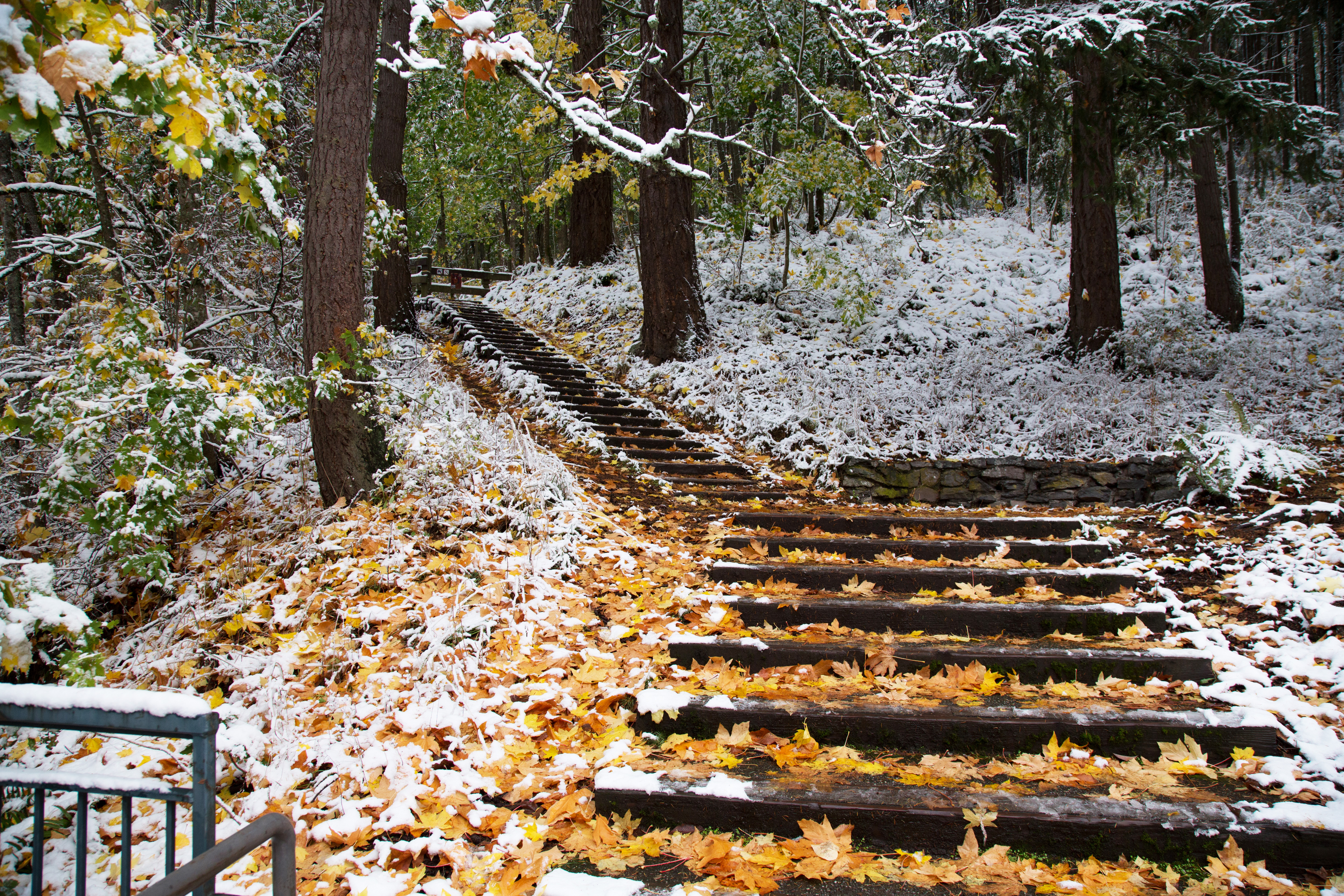Snow covers the steps behind Edens Hall leading into Sehome Arboretum. Hailey Hoffman//AS Review
By Sydnee Smith
The large amounts of snow this year challenged students like Luke LeClair and Sydney Alexander, students with disabilities, in getting to their classes effectively. LeClair stated their disapproval for Western’s action in regards to their snow policy.
LeClair only lives a few blocks off campus, but still had difficulty getting to class in the snow. During that time they were unable to get to their math test. LeClair first came to campus for a meeting and was dropped off by their partner. After the meeting, LeClair tried to get home using streets and sidewalks. As they use a wheelchair to get around, their chair got stuck in the snow when they tried to get onto the sidewalk.
They were unable to get out of the snow alone and had to wait for a stranger to come and push them out. The person walked LeClair the rest of the way back to their home. But, when LeClair went to get back to campus for their math test, they got stuck again. By the time another person came to help, LeClair had missed their math test.
“Even if campus is cleared, which it generally isn’t particularly clear, you have one path you can get through. The risk of me getting stuck or not being able to traverse the terrain is very scary for me. It’s not like I think I’m gonna get horribly injured or anything, but there’s something deeply dehumanizing in just being asked to go somewhere and not physically being able to do it,” LeClair said. “I feel like people don’t think about it very much, it’s really hard to imagine what it’s like to be in a wheelchair if you’ve never lived it.”
LeClair decided to drop their math class, as they wouldn’t have been able to pass after missing that test. Although they know they have the option of using the Disability Access Center to help them make up the test, they don’t see the battle worth fighting for at this point.
LeClair mentioned when it feels very unwelcoming in a space, it doesn’t feel worth it to push to stay in the space. They have special withdrawal privileges and drop classes frequently because professors won’t work with accessibility requirements all the time.
Before their wheelchair, LeClair stated they were housebound, rarely able to leave. They were only able to take part-time classes.
“My wheelchair means I can have a life outside of my home and when there are barriers to me being able to have a life outside of my home, just because I’m in the wheelchair, it feels like the people in charge must really not care about me at all,” LeClair said.
Although LeClair and Alexander say that the winter weather policy has gotten better over the last two years, it doesn’t take into account the whole student body. Alexander says there has to be a better way to handle the weather, such as having classes run online.
Alexander had professors that were much more accomodating. However, she still had trouble getting to and from her class. Alexander’s joints can sometimes slide out of place. Due to using different muscles to get traction, her knee can slide in and out of place trying to get to class.
For Alexander, the pain afterwards was the worst part. Cold weather can already aggravate muscles and the pain of her knee sliding in and out made things worse.
“I don’t think people think about how dangerous it is, not even just for people with disabilities, but for able-bodied people. It’s dangerous weather and it’s weather we’re not used to, people were acting like it’s not a big deal,” Alexander said. “What if my knee had been worse? It felt kind of neglectful.”
She states she could have missed class, but because there was information being given out and information she knew she was missing, she felt obligated to still try to go. Although, Alexander said she did skip class once it was dark, as she felt it was too dangerous to walk at that time.
Alexander doesn’t understand why the classes can’t be instructed online, as most people can get access to the internet while not on campus.
“I think all staff needs to remember that for some people walking is hard on a normal day. You have to ask if the information is that important, can you give it another day,” Alexander said. “It’s not just your immediate safety but its your long term physical health that’s at stake and it doesn’t feel like everything is taken into account for the whole student body when these decisions are made.”
McKenzie Bolar, AS disability outreach center community engagement coordinator, mentioned it is very hard for students with disabilities to navigate their days when the school weather reports are so day-to-day. Bolar said for a lot of students they have to plan ahead and need to know when they can afford to stay home.
“It was the super late texts that would come at six in the morning, these students have already prepared their stuff, but then there’s no school. For a number of people, it’s very disruptive to their schedules and it puts people in a certain mental space where you’re just unsure of what’s happening or how to move forward with your day-to-day schedule,” Bolar said.
They suggested that the university should take a look at how much snow there is and send out one alert saying due to the amount of snow school will be canceled for a certain number of predetermined days. They also said this could be determined by how fast they would be able to make wider, more accessible pathways around campus.
LeClair said major issues are that ramps and curb cuts aren’t cleared and although campus was better this year, they wouldn’t consider it safe.
Attached is Western’s winter weather policy.

